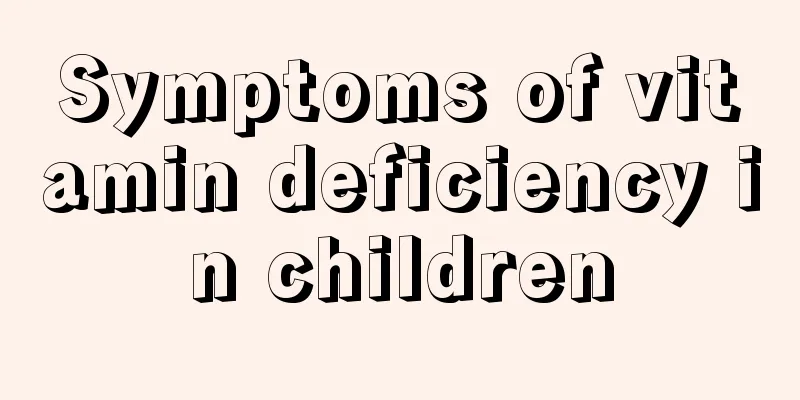Symptoms of vitamin deficiency in children

|
Vitamins are essential trace elements for the human body. If the body lacks vitamins, corresponding metabolic reactions will occur, which will induce vitamin deficiency. There are many types of vitamins. The lack of different vitamins in the body will cause different deficiency symptoms. We need to have a comprehensive understanding and promptly discover and solve problems in children. So, what are the symptoms of vitamin deficiency in children? 1. Vitamin A deficiency The child's skin becomes dry and rough, with small bumps all over the body, like chicken skin; the hair is sparse, dry, and dull, and the nails become brittle and changed in shape; the conjunctiva and cornea of the eyes (commonly known as the black pupil) also develop lesions, with mild cases causing dry eyes, photophobia, and night blindness (commonly known as chicken eyes); severe cases causing black pupils to become turbid, ulcers to form, and finally perforation leading to blindness. People who are deficient in vitamin A generally have poor immune function and are susceptible to respiratory diseases such as colds. 2. Vitamin B1 deficiency If infants and young children lack vitamin B1, they are likely to suffer from symptoms such as loss of appetite, indigestion, weight loss, slow growth, etc. If the deficiency is severe, they are prone to beriberi, edema, muscle atrophy, slow heartbeat, etc. Since vitamin B1 is also involved in carbohydrate metabolism and nerve conduction in the body, and is involved in the composition of pyruvate decarboxylase in the body, when it is deficient, the activity of this enzyme decreases, the pyruvate level in the blood increases, the body's energy production decreases, and the brain's energy metabolism is impaired, resulting in pathological changes in the nervous system and other systems. 3. Vitamin B2 deficiency The facial skin is reddish, greasy, and scaly, which is medically known as seborrheic dermatitis. It not only affects beauty but also attracts bacterial invasion and causes folliculitis. At the same time, the tongue, lips, scrotum and other parts of the body may also become inflamed, causing pain and discomfort. 4. Niacin deficiency Niacin deficiency makes human skin particularly "delicate". Once exposed to the sun, it will develop rashes and the facial skin will become thicker and rough. Doctors call this pellagra. In addition, symptoms such as diarrhea, headache, insomnia, irritability, and dementia may also occur. 5. Vitamin C deficiency Vitamin C plays an outstanding role in hematopoiesis, protecting blood vessels and promoting brain development. If the intake is insufficient, the first symptoms will be decreased appetite, anemia, bleeding of the gums, nasal mucosa and skin, etc. It also has an adverse effect on children's IQ, causing their development to lag behind that of children of the same age. |
Recommend
Why does a child pee at night?
Everyone knows that babies don’t have much though...
What’s going on if my baby has jam-colored stools?
For many parents, they have no experience with th...
What are the calcium supplement recipes for children to increase height?
The growth and development of children is always ...
How to treat mumps in an 8-year-old child?
Mumps is most common in children. The parotid gla...
Child coughing in the morning
If a child has symptoms of coughing in the early ...
Can children eat Gorgon fruit?
Because children's intestinal absorption and ...
How long after getting polio vaccine can I take a shower?
Taking a bath is a common thing in daily life. Es...
Is it normal for a two year old to not be able to speak?
Is it normal for a two year old to not be able to...
What to do if baby has lice in hair
The baby's body is relatively weak and is mor...
Symptoms of food indigestion in children
When it comes to children, what parents worry abo...
What is the appropriate water temperature for a newborn baby's bath?
Bathing a newborn is a difficult problem for ever...
Why is baby's poop white?
It is the common wish of every baby that he or sh...
Why does my child vomit after eating?
Many parents see their babies vomiting after eati...
What should I do if my child eats chewing gum?
Last week, when my mother-in-law was taking care ...
How can children grow taller quickly
How tall a child can grow depends on many factors...









